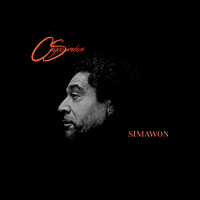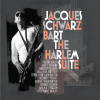Home » Jazz Musicians » Jacques Schwarz-Bart
Jacques Schwarz-Bart
Undoubtedly Jacques Schwarz-Bart shares this vision put forth by the writer Patrick Chamoiseau, “The contemporary melting pot of cultures and ethnicities has created a worldwide phenomenon of “creolisation”.. This New York based jazz saxophonist, praised by major American soul artists, raised by a Black Guadeloupean mother and a French Jewish father-, grew up between Switzerland and Guadeloupe… The son of two award wining novelists, Jacques followed an original and sinuous path that speaks volume about his identity. He was born in the suburbs of Pointe a Pitre on December 22nd 1962. In those days, it wasn’t proper to speak Creole, and playing Gwoka drums was left to Negroes from the woods, “fat heels Negroes”, who kept alive the spirit of the runaway slaves, the Maroons, and celebrated their African Heritage. These were vividly described in the novel “a woman called Solitude” by André Schwarz-Bart (1972), through the story of a slave woman that took an important part in the revolt against the French repression in 1802. In Pointe a Pitre, a statue reminds us of this important piece of history, never mentioned in official French school books, and symbolizes the tenacity of a different identity. It is this different identity that is the soil for Jacques’ inspiration in his new CD. Jacques Schwarz-Bart comes from this background of parents concerned with Caribbean music, Caribbean history, as shown through their respective works, starting with “Pork and Green Bananas”, co written by Simone and André in 1967: “separation is a great ocean, where many have drowned”. Certainly, this reflection alluding to the tragedy of the crossing of the Atlantic from Africa, was food for thought for Jacques Schwarz-Bart, as it defines a common ground between all societies built on the enslavement of Africans, a common geo-historical space, and, furthermore, a common esthetics. As part of that space, both Gwoka and Afro American/Jazz music attempt to exorcise the “hopes and torments of the creole soul”. Guy Conquete, the great Gwoka poet, foresaw the natural Union of those two musical forms: “Cotton fields, sugar cane fields”. Says Jacques, “The great common denominator between all the styles I love, being Gwoka, Jazz, or Soul, is that the music starts with the drums. It is all about the feel. The word “Gwoka” comes from N’goka, a word from central Africa that means: the drums. It is interesting that gwoka and jazz even shared the same name at one point: Bamboula.
Read moreTags
Roy Hargrove's Crisol: Grande-Terre

by Chris May
Increasingly and with growing momentum, right up until he died at the young age of 55 in 2018, Roy Hargrove was a standard bearer for a new kind of African American jazz. The recipe embraced a variety of styles--jazz, Afro-Cuban music, funk, hip hop and soul--and it influenced a generation of musicians in jazz and beyond. But Hargrove never abandoned jazz, the foundation stone of his style. Instead he regarded other genres as part of a rainbow ...
Continue ReadingBlack Lives: People Of Earth

by Glenn Astarita
Black Lives is not just a band; it is a movement. Comprised of globally recognized artists across generations and genres, their mission transcends mere musical performance. They aim for a utopia, especially in these turbulent times where words of hate and racism proliferate faster than cat videos on the internet. Now more than ever, their cause is vital. The album does not veer away from its intentions: to raise awareness, inspire change, and celebrate unity. Musicians from the ...
Continue ReadingJean-Paul Bourelly: Black Lives - From Generation to Generation

by Vic Albani
Doppio CD o doppio vinile prodotto in HI-Res e con packaging di lusso dalla Jammin'colorS, agenzia per artisti jazz, world, funk, alternativi, hip-hop, electro e sperimentali nonché etichetta indipendente. Il lavoro che ha pubblicato in tanta pompa magna è un ampio collage di musica nera realizzato da 25 musicisti africani, caraibici e afroamericani guidati dalla visione creativa di Stefany Calembert (compagna del bassista jazz Reggie Washington) e produttrice estemporanea dell'etichetta belga. A tutti è stato chiesto di comporre ...
Continue ReadingJacques Schwarz-Bart: The Harlem Suite

by John Chacona
Tenor saxophonist Jacques Schwarz-Bart has lived in Paris, Senegal, and Switzerland as well as his native island of Guadeloupe, but his 18 years in Harlem were crucial to his life and career. It was there that he found himself at an inflection point in the dynamic music scene of the late '90s, playing with such transformative visionaries as Roy Hargrove, D'Angelo and Meshell Ndegeocello. With The Harlem Suite, Schwarz-Bart nods affectionately to that time and those figures while ...
Continue ReadingVarious Artists: Black Lives - From Generation to Generation

by Glenn Astarita
Indeed, African Americans are the architects of several musical formations, hearkening back to Scott Joplin's development of 'ragged' rhythms i.e., Ragtime, along with blues, funk, jazz, and other genres, often evolving into various tangents and offshoots. And on this comprehensively entertaining set produced by Belgian Stefany Calembert with assistance from her husband and acclaimed bassist Reggie Washington, they righteously bestow Black Music as a “source of moral truth and potent weapon against racism." Numerous stars such as saxophonist ...
Continue ReadingJacques Schwarz-Bart's Afro-Caribbean Odyssey

by John Chacona
The saxophonist Jacques Schwarz-Bart was born on the Caribbean island of Guadeloupe in the shadow of La Grande Soufrière, which is both an active volcano and the highest mountain in the Lesser Antilles. Both aspects of that peak get to the heart of Schwarz-Bart's career, which has been characterized by rapid ascents and explosive creativity. About those heights: Schwarz-Bart, who is 58, didn't take up the saxophone until he was 24 years old. Three years later, he was ...
Continue ReadingJacques Schwarz-Bart: Sone Ka-la 2: Odyssey

by Dan McClenaghan
The French-Jewish-Guadeloupean saxophonist Jacques Schwarz-Bart--a background and name like that has world music written all over it--presented his Sone Ka-La (Emarcy) in 2007, after stints with D'Angelo's Voodoo touring band, Roy Hargrove's Crisol and Rh Factor, Erykah Badu, Meshell Ndegeocello, all influences that helped him craft a hybridization of Afro-Caribbean rhythms and melodies inspired by Gwoka traditions of his native island of Guadeloupe. Gwoka is a music born on the western Atlantic Island in response, in part, to the miseries ...
Continue ReadingThe Art Of Dreaming, By Saxophonist Jacques Schwarz-Bart, Set For September 25 North America Release

Source:
Michael Bloom Media Relations
Saxophonist Jacques Schwarz-Bart’s most recent CD, “The Art of Dreaming", released in Europe earlier this year, is set to debut in the United States and Canada by Naïve/Naxos on September 25, 2012. The project is called “The Art of Dreaming" because of the state of heightened awareness shared when musicians play together, which can be described as ‘”dreaming while awake”. According to Carlos Castañeda, anthropologist and author, ancient Toltec sorcerers had developed the art of staying aware while dreaming, in ...
read more
Jacques Schwarz-Bart Featuring Stephanie McKay: 'Rise Above' on Dreyfus Jazz August 31

Source:
Chris M. Slawecki
Soulful sax man Jacques Schwarz-Bart makes his Dreyfus Jazz recording debut with Rise Above, an eclectic blend of jazz and neo-soul featuring the stirring vocal stylings of former Brooklyn Funk Essentials singer Stephanie McKay. Rise Above is an epic culmination of this son of a Black Guadeloupean mother and a French Jewish father's diverse experiences. “The great common denominator between all the styles I love, being Funk, Jazz, Soul and R & B, is that the music starts with the ...
read more
Roy Hargrove
trumpetPhotos
Music
Cama De Gato
From: Tempo BomBy Jacques Schwarz-Bart
































